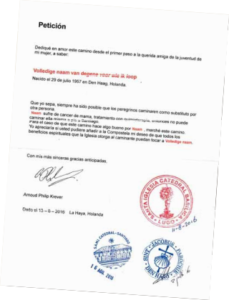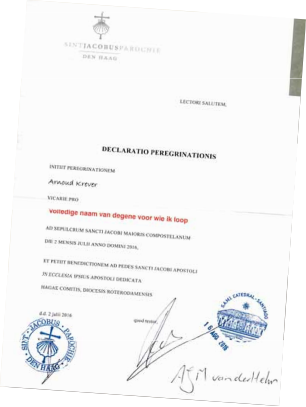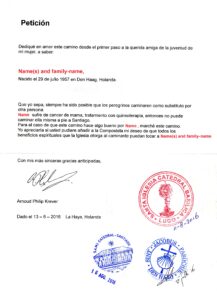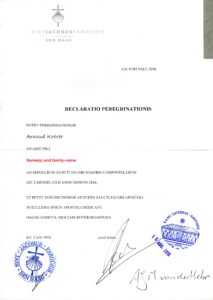It is possible for pilgrims to walk or cycle to Santiago for someone else. The Catholic Church states that the spiritual advantages thus acquired benefit the other person. There are, however, some conditions.
It is April 2004. Like so many others I am on the road to Santiago to honour the memory of a beloved person. In this case my wife Willie Malkus, who died of breast cancer on 25 July 1999. I intend to dedicate the pilgrimage to her and get a Compostela with her name on it. I fear misunderstandings on my arrival at the Pilgrims’ Bureau. Therefore I come prepared with a request translated into Spanish stating I am an agnostic and have walked for Willie so that it would benefit her, and to write out the Compostela in her name. To make doubly sure I buy two pilgrim passes, one in in my own name and one in Willie’s. Starting in The Hague I collect double stamps everywhere.
For whom?
In June 2015 I arrived in Santiago, in the company of my second wife Annet who had joined my walk from Sahagún. Things at the Pilgrims’ Bureau turned out quite differently from expected. No compostela could be registered in Willie’s name. In my name this was possible, but then with the handwritten addition vicarie pro, followed by Willie’s name. Annet, who thought this had wronged me, then wanted to dedicate her compostela to me. This was firmly refused based on the argument that it is only permitted to walk or cycle a pilgrimage as a substitute for someone unable to do this himself. And I stood there next to her in excellent physical condition with around 3000 kilometres behind me.
Who are the persons fitting within this rule of people to walk for? Those too old, too disabled or seriously ill – think of cancer patients – and on the other side of the scale children too young for such a pilgrimage. A second rule prescribes that a relationship must exist between the pilgrim and the person for whose benefit the pilgrimage takes place. Therefore, walking for someone unfamiliar to you or you have no feelings for is out of the question.
‘Vicarie pro’ means ‘as a replacement for’. The person you walk (or cycle) for is the actual pilgrim. As it were, you are no more than his or her feet. This implies that the spiritual benefits given by the Church to the pilgrim are transferred to the person on whose behalf you walk. To put it bluntly: the celestial bonus points gained by walking, are added to the celestial bank account of the person you have walked for. These spiritual advantages consist of a partial, or, in a Holy Year, plenary indulgence, a pardon for your sins and revoking the punishment involved.
Conditions for an indulgence
In a Holy Year (when Saint James’ name-day, 25 July, happens on a Sunday) posters appear in the Pilgrims’ Bureau stating the conditions for acquiring a (plenary) indulgence: as a minimum the final 100 km (on foot) or he final 200 km (by bike) must have been finished with a religious or spiritual motivation. The cathedral has to be visited. In doing so, one has to a say a prayer. For example the Our Father. In addition, the pilgrim has to take confession and communion within 15 days. These actions are not intended for non-Catholics. The Church states they cannot take communion or confession. Fortunately, the Church does apply the rule that the Mother Church fills out the demands that a sincere pilgrim can or cannot fulfill. So all will be well!

Petición (Request).
From the very first step this camino is dedicated to my wife’s dear friend from her youth, …. (Full name)
Born on 29 July 1957 in The Hague, The Netherlands.
As far as I know it has always been possible for pilgrims to walk as a substitute for another person.
(First name) suffers from breast cancer, chemo therapy treatment, and therefore cannot walk to Santiago herself.
Should this camino lead to a positive outcome for ( First name) I have walked this camino.
I would appreciate you adding my wish to the Compostela that all spiritual benefits presented by the Church to the pilgrim may be given to (Full name).
Thanking you in advance.
A mourning process
The spiritual benefits go to the person one walks for. How much remains for you, being the ‘the pilgrim’s feet’? In my case an intense mourning process after Willie’s death. In addition, there is the enjoyment of walking, the landscape and meeting other pilgrims. The first pilgrimage was followed by many others along various Spanish routes. Each time I walked for others. This provides me with extra motivation to continue in spite of setbacks. I find it hard to quit and go home on the excuse of terrible rain. Things are expected from me. They add purpose to my camino. A woman friend who died of cancer recently was overjoyed when I walked the Camino Portugués for her, even though she was an agnostic like me. She always held the photo album of my pilgrimage close at hand. Maybe the camino made dying slightly easier for her.
Preparation
I tend to follow a fixed pattern in preparing for a new camino. I always ask a person whether he or she would appreciate me walking to Santiago for them. If it involves a deceased person I usually ask the relatives. In practice there (unfortunately) are too many people who this applies to. Next I write a petición in Spanish, a request, stating who I walk for, my relationship with this person, why they cannot walk themselves and that it is my wish that all spiritual benefits given by the Church to the pilgrim may be granted to the person I walk for.
I make an appointment for a pilgrim’s blessing with Ad van der Helm, pastor at the Jacobuskerk in The Hague. Beforehand I send him the petición, so that he knows who I am walking for. As an agnostic I still find a pilgrim’s blessing a worthy and appropriate start to a pilgrimage. I am often accompanied by the person I walk for, who is then blessed as a pilgrim and next me as ‘his or her feet’. Some paper work follows the blessing. Pastor Van der Helm has redacted a standard Declaratio Peregrinationis, a statement in Latin concerning my pilgrim’s blessing and departure. It also states that I walk vicario pro and for whom. A Church stamp turns this into an official ecclesiastical document.

Declaratio Peregrinationis (Pelgrimsverklaring). Translation:
To the reader / Pilgrim’s statement / has initiated pilgrimage/…/
As a substitute for /…/ To the grave of St James of Compostela / Day 2 of the month of July (in the) year of Our Lord 2016 /
And has requested / gained the blessing at the feet o(of the statue) of St. James the Apostle / In the church dedicated to the same apostle / City of The Hague, Rotterdam Diocese / dated 2 July 2016 / As witnessed by / signature and stamp
In full faith
These papers are not really essential at the Pilgrims’ Bureau in Santiago. People work in full faith there. But they do clarify the situation. An ecclesiastical document from The Hague is not to be denied at the Bureau. When requested the Bureau stamps these documents. After my return the person I have walked for (or their family) receives all the original papers: compostela, pilgrim’s pass, petición and declaratio peregrinationis, all photos on a DVD and a silver Santiago shell. After all, he I or she is the pilgrim, and this is worth showing!
Download permissions
* Saint James Associations have the permission to publish, free of charge, the articles in their periodicals.

